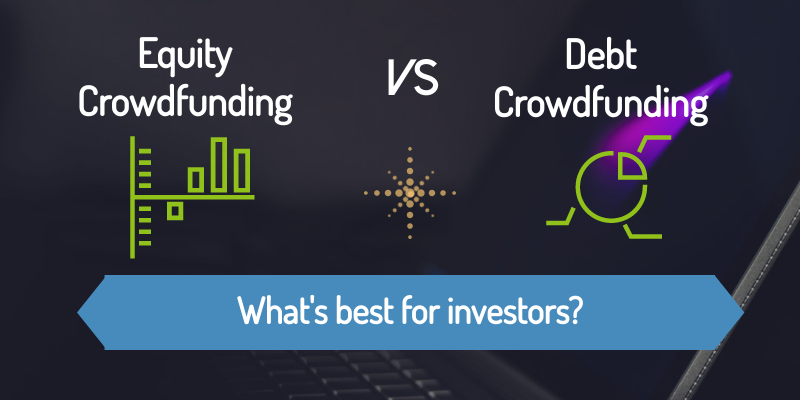Equity vs. Debt Crowdfunding

Written by
Justin Kuepper
Published on
Feb 04, 2022
Last updated
Feb 04, 2022
Crowdfunding has become a popular way to fund everything from art projects to small businesses. While Kickstarter brought rewards-based crowdfunding into the limelight, Regulation CF opened the door to equity and debt crowdfunding, enabling investors to participate in investments previously only available to the wealthy.
Let's look at the difference between equity and debt crowdfunding from an investment and a business standpoint.
A Quick Crowdfunding Primer
Regulation CF became law with the passage of the Jumpstart Our Business Startups (JOBS) Act in 2016. Before the JOBS Act, only accredited investors with a net worth of at least $1 million or an income of $200,000 could lend to private companies. Regulation CF makes it possible for anyone to invest through intermediaries.
There are a few rules to follow:
- Anyone 18 years or older with a U.S. tax ID can invest $2,200 in crowdfunding deals in a rolling 12-month period.
- If your income or net worth is below $107,000, your investment cap is 5% of the greater of your income or net worth.
- If your income and net worth are above $107,000, your investment cap is 10% of the greater of your income or net worth.
From a business standpoint, Regulation CF enables businesses to raise up to $5,000,000 during a rolling 12-month period. New changes to Regulation CF also eased the so-called "test the water" rules, enabling businesses to ask supporters if they support a campaign rather than being forced to take any money they raise.
What is Debt Crowdfunding?
Debt crowdfunding involves loaning money to a person or business. These loans usually work like a line of credit: The lender provides the borrower with upfront capital for a set period, the borrower makes periodic interest payments, and the principal payment is made at the end of the loan term, and the loan is over.
Many profitable businesses prefer debt crowdfunding because it enables business owners to retain their equity. If the company can invest the proceeds of a loan into endeavors with a higher return than the interest rate, business owners make more money without risking their capital. And, investors benefit from a steady and predictable income stream.
Pros
- Borrowers don't give up their upside potential.
- Lenders generate regular income through interest payments.
- Lenders have greater security because a business' assets typically secure its debt.
Cons
- Borrowers must make regular interest payments, reducing their cash flow throughout the loan term.
- Lenders don't have any upside beyond the interest payments.
- There's a finite relationship between borrowers and lenders that ends when the loan term expires.
What is Equity Crowdfunding?
Equity crowdfunding involves selling a certain amount of ownership in a business. Most equity crowdfunding involves common stock that provides the holder with a specific ownership stake. As with public companies, the ownership stake doesn't necessarily give the investor any income—it's more like a lottery ticket for a future payday.
Most startups use equity crowdfunding because they do not have any current cash flow to pay interest. By raising money, business owners can bring their ideas to life, and everyone can share in the wealth. However, it's worth considering that these investments have far less liquidity than public company stocks that trade on stock exchanges.
Pros
- Investors may have unlimited upside potential depending on the nature of the specific agreement.
- Investors and business owners build long-term relationships.
Cons
- Investors don't necessarily receive any income unless there's a profit-sharing component.
- Investors cannot quickly sell their share of the business for a fair price unless there's a market.
- Investors have less security because companies must pay off debts before shareholders receive anything in bankruptcy.
- Business owners permanently give up some of their upside potential from the company.
Choosing Between Equity & Debt
The decision between equity and debt crowdfunding depends on your investment objectives.
Investors seeking a steady income—such as retirees—may prefer debt crowdfunding. While equity crowdfunding provides profit-sharing, debt interest payments are set amounts that you can rely on, whereas profit-sharing varies over time depending on a company's profitability. Debt is also much more secure, resulting in greater capital preservation.
On the other hand, investors that want to realize the greatest upside should invest in equity crowdfunding deals. The most common equity crowdfunding campaigns are among startups since they don't have the cash flow to support debt interest payments. However, these startups could become the next big success stories.
The Bottom Line
Regulation CF provides investors with access to private investment opportunities previously only available to the wealthy. These opportunities generally come in either debt crowdfunding or equity crowdfunding forms. The right decision depends on your individual financial goals and the projects you'd like to support.
If you're interested in crowdfunding for good, VirtueScout has a database of opportunities to invest in small businesses, renewable energy, and other high-impact projects to make a positive impact and earn a financial return.
